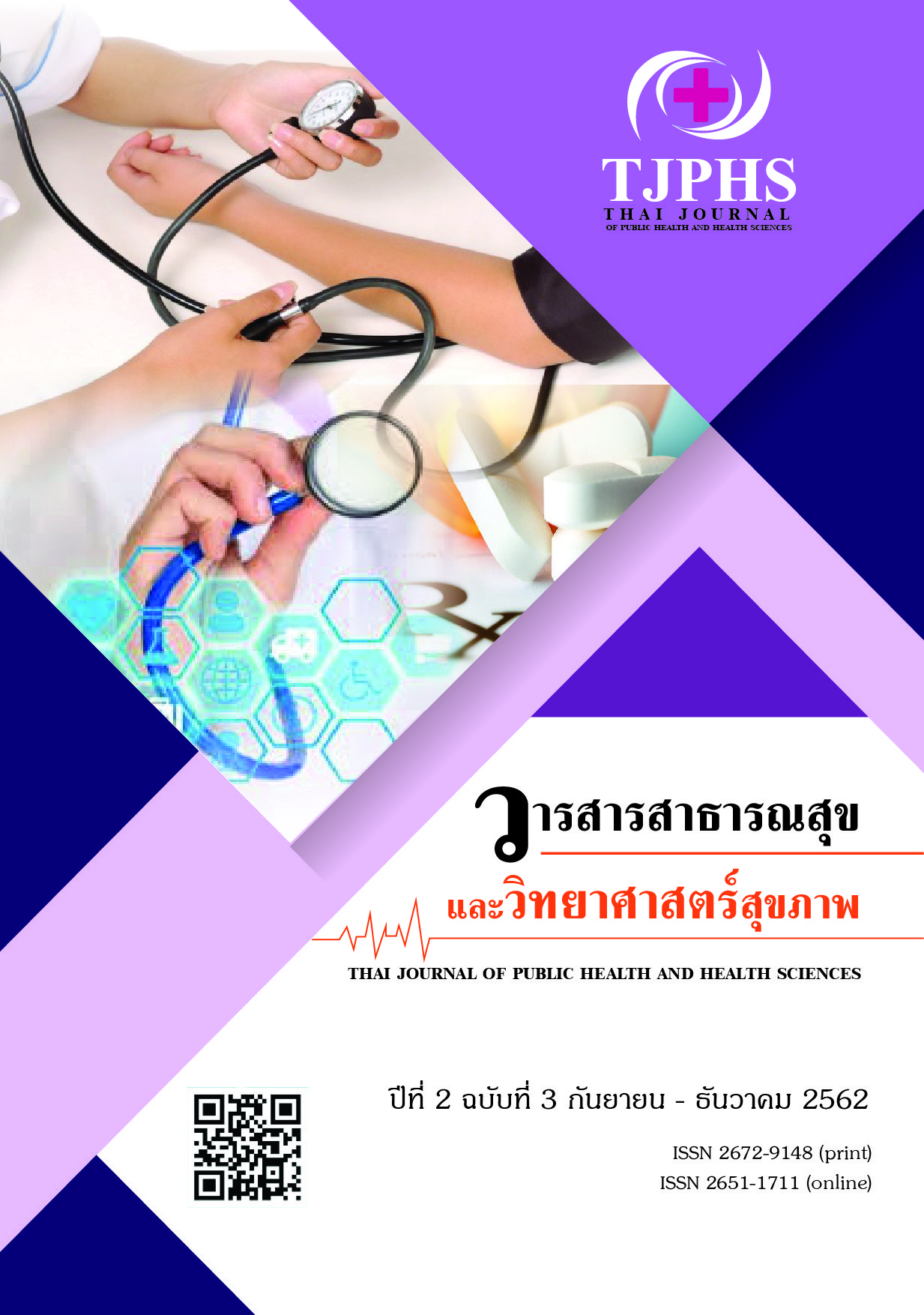ผลของโปรแกรมการประยุกต์ใช้ทฤษฎีการรับรู้ความสามารถแห่งตน ร่วมกับแรงสนับสนุนทางสังคมต่อพฤติกรรมการใช้ยาของผู้สูงอายุที่ป่วยเป็นโรคเบาหวานชนิดที่ 2 ที่ไม่สามารถควบคุมระดับน้ำตาลในเลือดได้ ตำบลเสม็ด อำเภอเมือง จังหวัดชลบุรี
คำสำคัญ:
ผู้สูงอายุ, โรคเบาหวาน, พฤติกรรมการใช้ยาบทคัดย่อ
การวิจัยครั้งนี้มีวัตถุประสงค์เพื่อศึกษา ผลของโปรแกรมการประยุกต์ใช้ทฤษฎีการรับรู้ความสามารถแห่งตนร่วมกับแรงสนับสนุนทางสังคมต่อพฤติกรรมการใช้ยาของผู้สูงอายุที่ป่วยเป็นโรคเบาหวานชนิดที่ 2 ที่ไม่สามารถควบคุมระดับน้ำตาลในเลือดได้ ซึ่งรูปแบบการวิจัยเป็นแบบกึ่งทดลอง ผู้เข้าร่วมวิจัย คือ ผู้สูงอายุที่ป่วยเป็นโรคเบาหวานชนิดที่ 2 ที่ไม่สามารถควบคุมระดับน้ำตาลในเลือดได้ อายุระหว่าง 60 – 69 ปี จำนวน 50 คน เก็บรวบรวมข้อมูลโดยใช้แบบสอบถามก่อนและหลังให้โปรแกรมและนำข้อมูลมาวิเคราะห์ด้วยสถิติ Paired Sample t-test
ผลการวิจัยพบว่าภายหลังการจัดกิจกรรมให้ผลของโปรแกรมการประยุกต์ใช้ทฤษฎีการรับรู้ความสามารถแห่งตนร่วมกับแรงสนับสนุนทางสังคมต่อพฤติกรรมการใช้ยาของผู้สูงอายุที่ป่วยเป็นโรคเบาหวานชนิดที่ 2 ที่ไม่สามารถควบคุมระดับน้ำตาลในเลือดได้ ผู้เข้าร่วมวิจัยมีคะแนนความรู้เกี่ยวกับการใช้ยา การรับรู้ความสามารถแห่งตนเกี่ยวกับการใช้ยา และพฤติกรรมการใช้ยาสูงขึ้นอย่างมีนัยสำคัญทางสถิติ (p-value < 0.001) ซึ่งสามารถใช้โปรแกรมการประยุกต์ใช้ทฤษฎีการรับรู้ความสามารถแห่งตนร่วมกับแรงสนับสนุนทางสังคมต่อพฤติกรรมการใช้ยาของผู้สูงอายุที่ป่วยเป็นโรคเบาหวานชนิดที่ 2 ที่ไม่สามารถควบคุมระดับน้ำตาลในเลือดได้ เป็นแนวทางในการสร้างกลวิธีการให้ความรู้ เพิ่มการรับรู้ความสามารถแห่งตนของผู้สูงอายุที่ป่วยเป็นโรคเบาหวานชนิดที่ 2 ที่ไม่สามารถควบคุมระดับน้ำตาลในเลือดได้ เพื่อนำไปสู่พฤติกรรมที่ถูกต้อง และติดตามประเมินผลได้ในระยะยาว
เอกสารอ้างอิง
Journal of Nursing and Health, 9 (1), 32-46.
Department of Provincial Administration (2017). Statistical data of elderly in Thailand 2016.
[Online]. Retrieved from https://www.dop.go.th/en/know/1/51 (In Thai)
Department of Medical Services. National Health Security Office. (2010). Medical practice guidelines
for prevention and treatment for complications from diabetes. 2nd edition, Bangkok: The Agricultural Cooperative Printing House of Thailand. (In Thai)
Diabetes Association of Thailand. (2017). Thai people have more diabetes. [Online].Retrieved from:
https://www.dmthai.org. (In Thai)
Diabetes Association of Thailand under the patronage of Her Royal Highness Princess Sirindhorn.
(2017). Clinical Practice Guidelines for Diabetes 2017 Clinical Practice Guideline for Diabetes
2017. (3rd edition). Bangkok: Romyen Media Company Limited.
Khamwong, S. and Banchornhahandkarak, P. (2013). The results of health education program by
applying theory of self-efficacy with social support among patients with type 2 diabetes who received treatment in Nongkungphueak Health Promoting Hospital, Nongkung Si District, Kalasin Province. Srinakarin Vejsarn 28 (4). 451-4 460. (In Thai)
Health Data Center (2017). Diabetes morbidity rate [Online]. Retrieved from
https://hdcservice.moph.go.th/ (In Thai)
National Statistical Office (2016). Number and proportion of Thai elderly. [Online].
Retrieved from: https://www.dop.go.th/en/know/1/45
Pholrak, R.. (2013). The effect of self-efficacy promotion program on the ability of insulin injection
Pen insulin injection and blood sugar levels in elderly diabetic patients. Master's Degree Thesis, Prince of Songkla University. (In Thai)
Poolsup, N. and Ouiprasert, P. (2005). The effect of pharmaceutical care on number of Drug Use
Problems and Blood Sugar Levels in Diabetic Patients. Srinakharinwitrot Journal of
Pharmaceutical Sciences, 10 (1), 10 - 16
Preechakul., S. (2001). The effects of outpatient pharmaceutical care on treatment compliance of
hypertensive patients in Sukhothai Hospital. Master thesis, Chiang Mai University.
Rod-ari, P. (2010). The impact of diabetes on health and illness. Situation Diabetes in Thailand.
Bangkok: Diabetes Association of Thailand. (In Thai)
Soichue, M, Benjakul, S., Kengganpanich, M., Kengganpanich, T. (2017). The results of arm swing
exercise program by applying recognition theory, self-efficacy with social support for elderly
in Bangkok. Journal of Boromarajonani College of Nursing, Bangkok. 33 (2) .73 -83. (In Thai)
Sota, C. (2011). Concepts, theories and applications for health behavior development.
Department of Health Education Faculty of Health Sciences Khonkaen University. (In Thai)
ดาวน์โหลด
เผยแพร่แล้ว
รูปแบบการอ้างอิง
ฉบับ
ประเภทบทความ
สัญญาอนุญาต
บทความทุกบทความที่ได้รับการตีพิมพ์ถือเป็นลิขสิทธิ์ของ วารสารสาธารณสุข
















